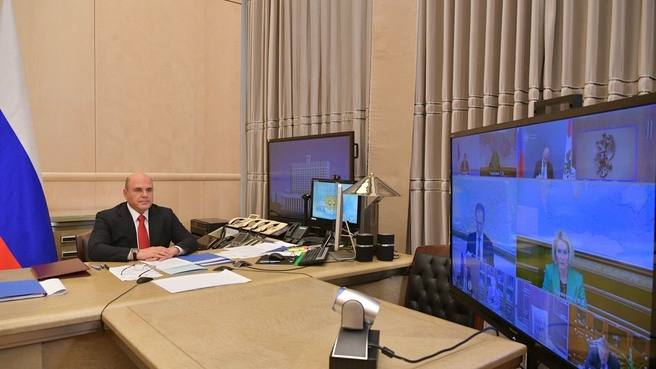Agenda: Purchasing oxygen concentrators for hospitals, expedited socioeconomic development programme for the Trans-Baikal Territory, the concept of developing electric car production.
Mikhail Mishustin’s opening remarks:
Good afternoon, colleagues.
Today we will discuss several important issues. Primarily, countering COVID-19.
As the outbreak persists, there is a higher demand for oxygen from healthcare providers. Oxygen is essential for treating patients with severe COVID-19. The Government has allocated over 650 million roubles for purchasing oxygen concentrators that will be delivered to hospitals in the 20 Russian regions where the shortage is critical.
It is important to maintain sufficient oxygen reserves. Regional officials must be able to foresee the demand and closely monitor the state of equipment. People’s lives depend on it.
Next, last year, we launched tailored development programmes in the ten regions with the lowest socioeconomic indicators. First results are starting to show. As per the President’s instructions, a similar programme has been approved for Kuzbass this year. We will continue to expand this practice to other regions.
The Government has approved a comprehensive programme for expedited socioeconomic development of the Trans-Baikal Territory. The 15-year programme is focused on large-scale investment activity. We will be lifting infrastructure-related restrictions and creating comfortable conditions for businesses in order to attract private funding.
The region’s prospects are mainly based on natural resources development and processing projects. There is significant untapped potential and the programme will help attract over 1 trillion roubles in private funding to this field.
The timber industry and agriculture will also be the focus of attention. Building new infrastructure, comprehensive development of rural areas and solutions for advanced wood processing are the priority steps under the programme.
There are also plans to expand the capacity of the Baikal‒Amur Mainline and the Trans-Siberian Railway, to develop the southern leg of the Trans-Siberian Railway, and to build and renovate roads and bridges. All these efforts will substantially improve the region’s logistics, considering its proximity to the border.
Of course, updating the social infrastructure is another priority. There are plans to build rural medical assistance centres and outpatient medical facilities, a regional children’s clinical hospital and a tuberculosis hospital in Chita, and to renovate the regional rehabilitation centre, in order to make healthcare services more accessible.
Overall, this comprehensive programme will create more than 50,000 jobs in the region.
One more question is about a promising area, where development will be favourable for several fields, particularly, for car manufacturing and its support industries. And will promote an up-to-date and comfortable urban environment, which is very important for achieving the national development goals endorsed by the President.
The Government has approved the concept of electric vehicles production and use for the next 10 years. The document concerns practically all car categories: from passenger cars to buses and heavy duty tractors. It determines key tasks in this area, including demand stimulation, such as through soft lending and drawing up comprehensive urban programmes. It is also necessary to build a ramified infrastructure of charging stations, above all so-called fast charging stations. And it is important to develop an industry producing consumer batteries and all the necessary accessories for them.
A number of countries have already declared their wish to give up vehicles driven by internal combustion engines. It is obvious that the future belongs to electric vehicles or cars using more environmentally safe engines. And we need to develop actively this area too; moreover, the country already has a certain number of competences.
We expect that putting the ideas and solutions implied by the concept into practice will let us develop our own electric car industry, attract private investment and create about 40,000 high-performance jobs along the entire process chain – from electrochemistry to manufacturing electric transport.












